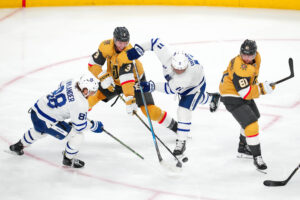The last meaningful week of the San Jose Sharks season began with hope. The team was playing well enough to put themselves in playoff contention with a good run. Then came the week before the All-Star break. The three game road trip can best be described by Quint, the shark hunter from Jaws, “The thing about a shark, it’s got lifeless eyes.”
The San Jose Sharks Season In One Week
The Sharks held their own for two periods with the Arizona Coyotes and with the season in the balance, played a lifeless final period before falling 6-3.
The following game against the Colorado Avalanche was worse. It started in the opening minute, with about as much going wrong as possible. Just moments into the game, Avalanche defenceman Cale Makar tripped Sharks forward Tomas Hertl. Alas, the referee decided to ignore it and play went on. After a whistle, the Avalanche broke out of their own zone. Avs forward Valeri Nichuskin beat Sharks defenceman Brent Burns (stop if you’ve heard this one before) down the ice and then beat goalie Martin Jones (stop me you’ve heard this one before) through the five-hole to give the Avs 1-0 lead just 45 seconds into the game.
The Sharks held their own for the next 19 minutes, before allowing a second score with only three seconds left in the opening period. The Sharks were, again, lifeless for much of the remainder of the game, a 4-0 loss where the final score accurately reflected the play on the ice.
In the post game, Sharks interim head coach Bob Boughner noted certain unspecified players were battling the flu and played anyway. Perhaps the flu explained that performance and maybe the prior one also. Perhaps the next one as well.
The final game before the All-Star break provided more of the same. The Sharks were outshot 27-7 in the first two periods, which is a pretty good indicator of lifeless, in a 4-1 loss to the Vancouver Canucks.
The Sharks New Reality
By week’s end, one thing was clear. Whatever flicker of hope there was for the playoffs before the road trip was fully extinguished at some point during it. To be fair, these were the first lifeless games under Boughner and they came at time when the team looked to have made genuine progress.
For a team with high hopes entering the season, it is a bitter pill not to make the playoffs. Worse still, to be so bad they know their fate even before the All-Star break. To miss the playoffs despite playing in the weakest division in the NHL. To miss the playoffs and not even hold a first-round draft pick. Yes, it is really bad.
The San Jose Sharks Season From Here
What remains of the San Jose Sharks season with playoff hopes done and an interim head coach? There are still 30 games of season left and there is plenty to do. Fun and exciting times won’t be part of this. The Sharks are about to embark on their first playoff-irrelevant games since 2015 (and second since 2003).
The remainder of this Sharks season is about next season and beyond.
In the NHL marketplace, the Sharks are sellers, meaning they will be trading current players for assets they can use in the future. Ian Reid goes over the entire roster and while there are a few quibbles with him on a few players’ value, his four-part series covers a lot of ground and covers it well.
Coming out of the All-Star break, the Sharks first item of business is to maximize the value of their players who are on the market. What does this mean? It means placing players in their optimal situation to upgrade their value.
The goal is to trade a players for bit more than they might be worth. For example, a player nominally worth a third round draft pick may fetch a second rounder instead because he plays well when scouts are looking closely. Given the Sharks current shortage of draft picks and modest farm system, it is essential to get the maximum value for each player traded. Whether picks or prospects, the Sharks need to restock.
Defencemen For Sale
The most obvious trade chip the Sharks have is left-handed defenceman Brenden Dillon. It is time to put Dillon with the player who he best fits with, which is Erik Karlsson. It is time to move him away from his current partner Brent Burns. Optimize him.
Last season, Dillon and Karlsson were an elite pairing. Why the Sharks coaches avoided this pairing this season is something that can’t be explained. Dillon is a very good player who gets none of the spotlight on a team with two Norris trophy winners and a third who won an Olympic gold. He should garner an excellent return.
It’s a shame the Sharks are unlikely to keep him with several more strong seasons ahead for him. Dillon’s strongest selling point may well be his ability to play effectively with others. The Sharks have three right-shot defencemen, and for each one, the highest Corsi For (CF%) comes when they are paired with Dillon.
Another pairing which worked very well last season and has been left on the shelf is Tim Heed with Marc-Edouard Vlasic. Heed is on the trade block and it is time to optimize him. He is a right-handed defenceman with a big shot. Not only should he see increased minutes with his optimal partner, but he merits some power play time to increase his value. Like Dillon, Heed’s statistics paint a favorable story. For each of the Sharks top three left-shot defencemen, their highest CF% comes when they are paired with Heed.
Extra Value For Defencemen
It is worth noting the market value of defenceman has likely increased with recent injuries to several good ones on playoff contenders. The Carolina Hurricanes Dougie Hamilton and the New York Islanders Adam Pelech are among them. The Toronto Maple Leafs lost both Morgan Rielly and Jake Muzzin, though Muzzin’s return looks likely in the next few weeks.
Also worth noting, since the start of the 2018-19 season, among Sharks defencemen, Dillon is second best in 5-on-5 goal differential at plus-8 and is second with a ‘goals for’ of 52%. The player ahead of Dillon in both categories is Heed, at plus-11 and 59% respectively. With both players likely to get moved, it is essential the Sharks play them with their best possible partners to maximize the team’s return in what looks to be a seller’s market.
Forwards and Netminders
Netminder Aaron Dell has taken the starting job from Jones, but he may be on the trade block. The Sharks should showcase him but not overplay him. Three games out of every four is about right, the last thing the Sharks need is for Dell to have an off game because he wore down by playing in too many consecutive games.
Fourth-line winger Melker Karlsson is certainly on the trade block. I’m not sure more ice time or higher lines will increase his value. He’s been overmatched on higher lines, but is an able penalty killer. Giving him solid minutes on an energy line is probably the best choice. Karlsson’s game has experienced an uptick since fellow Swede Joel Kellman joined him on the fourth line. There is nothing to sell high here, but perhaps there is room for an incremental improvement, which might be realized by upgrading the line with Barclay Goodrow replacing Stefan Noesen.
Patrick Marleau and Joe Thornton
Trading either of the team’s elder statesmen is a major discussion point in Sharks Territory. Sharks fans will not begrudge either Joe Thornton or Patrick Marleau the chance to play for a Stanley Cup. Any trade is their call, not the team’s. For the record, Thornton has contractual control and Marleau doesn’t. And it doesn’t matter.
Wilson is fully capable of making cold and calculating choices, but he will not trade either player unless they are fully on board with all aspects of a trade. Wilson will give them complete latitude and respect their decision. It is rare where players control the process, but the two have earned unique treatment.
The End of the Road
The Sharks may attempt to move a top end player for a big return (and more cap space). General manager Doug Wilson has swung for the fences before and landed big time players, he may part with one if the right situation comes available. Unlikely, but not out of the question.
The upcoming weeks are about playing players in optimal situations to increase the overall return in a trade. Right now, the Sharks need as much return as possible.
Once the trade deadline passes, the Sharks season will shift again and the team will feature player development. That many of these players disappointed early in the season is not important. Soon it will be time to see who has grown and has an NHL future and who isn’t making sufficient progress.
In the movie Jaws, the shark does plenty of damage (spoiler alert) but is ultimately blown up. After their lifeless road trip, this season’s San Jose Sharks are, metaphorically speaking, about to experience the same fate.
 ST LOUIS, MISSOURI – MAY 15: Brent Burns #88 and Erik Karlsson #65 of the San Jose Sharks talk against the St. Louis Blues during the third period in Game Three of the Western Conference Finals during the 2019 NHL Stanley Cup Playoffs at Enterprise Center on May 15, 2019 in St Louis, Missouri. (Photo by Elsa/Getty Images)
ST LOUIS, MISSOURI – MAY 15: Brent Burns #88 and Erik Karlsson #65 of the San Jose Sharks talk against the St. Louis Blues during the third period in Game Three of the Western Conference Finals during the 2019 NHL Stanley Cup Playoffs at Enterprise Center on May 15, 2019 in St Louis, Missouri. (Photo by Elsa/Getty Images)






